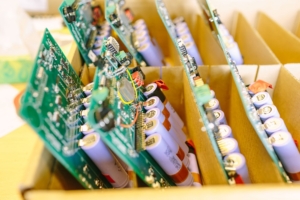 In the framework of the 41st Benelux Meeting on Systems and Control (5-7 July, Brussels), Professor David Howey (University of Oxford) delivered a lecture enitled “Data-driven battery health diagnosis in real-world applications”. David Howey is Professor of Engineering Science at the University of Oxford and Tutorial Fellow at St Hilda’s College. With Michel Kinnaert (Department of control engineering and system analysis, ULB), he is the promoter of the research project “Electrochemical model identification including aging for a digital twin of lithium-ion batteries”, one of the nine collaborative projects supported by the Wiener-Anspach Foundation for the 2022-2024 period.
In the framework of the 41st Benelux Meeting on Systems and Control (5-7 July, Brussels), Professor David Howey (University of Oxford) delivered a lecture enitled “Data-driven battery health diagnosis in real-world applications”. David Howey is Professor of Engineering Science at the University of Oxford and Tutorial Fellow at St Hilda’s College. With Michel Kinnaert (Department of control engineering and system analysis, ULB), he is the promoter of the research project “Electrochemical model identification including aging for a digital twin of lithium-ion batteries”, one of the nine collaborative projects supported by the Wiener-Anspach Foundation for the 2022-2024 period.
The complete programme of the Benelux Meeting on Systems and Control is available here.
Abstract of the lecture

Image: Ian Wallman
Accurate diagnostics and prognostics of battery health improves overall system performance. This allows industry to unlock value by detecting faults and improving maintenance and logistics, extending operational range, and understanding asset depreciation. However, battery aging is complex and caused by many interacting factors. Two key questions arise: first, how to handle modelling challenges, including parameter variability and nonlinearities, in methods for online estimation of state of health. Second, how to develop validated predictions of future health, where key issues include coping with variable usage scenarios, and cell-to-cell behavioural differences. This talk will discuss recent approaches to tackle some of these exciting topics, particularly focusing on diagnostics from field data, including the combining of non-parametric and parametric models to allow flexibility in model fitting from data, whilst retaining the benefits of equivalent circuit and physical models.
You can find here the list of collaborative research projects currently supported by the Foundation.


